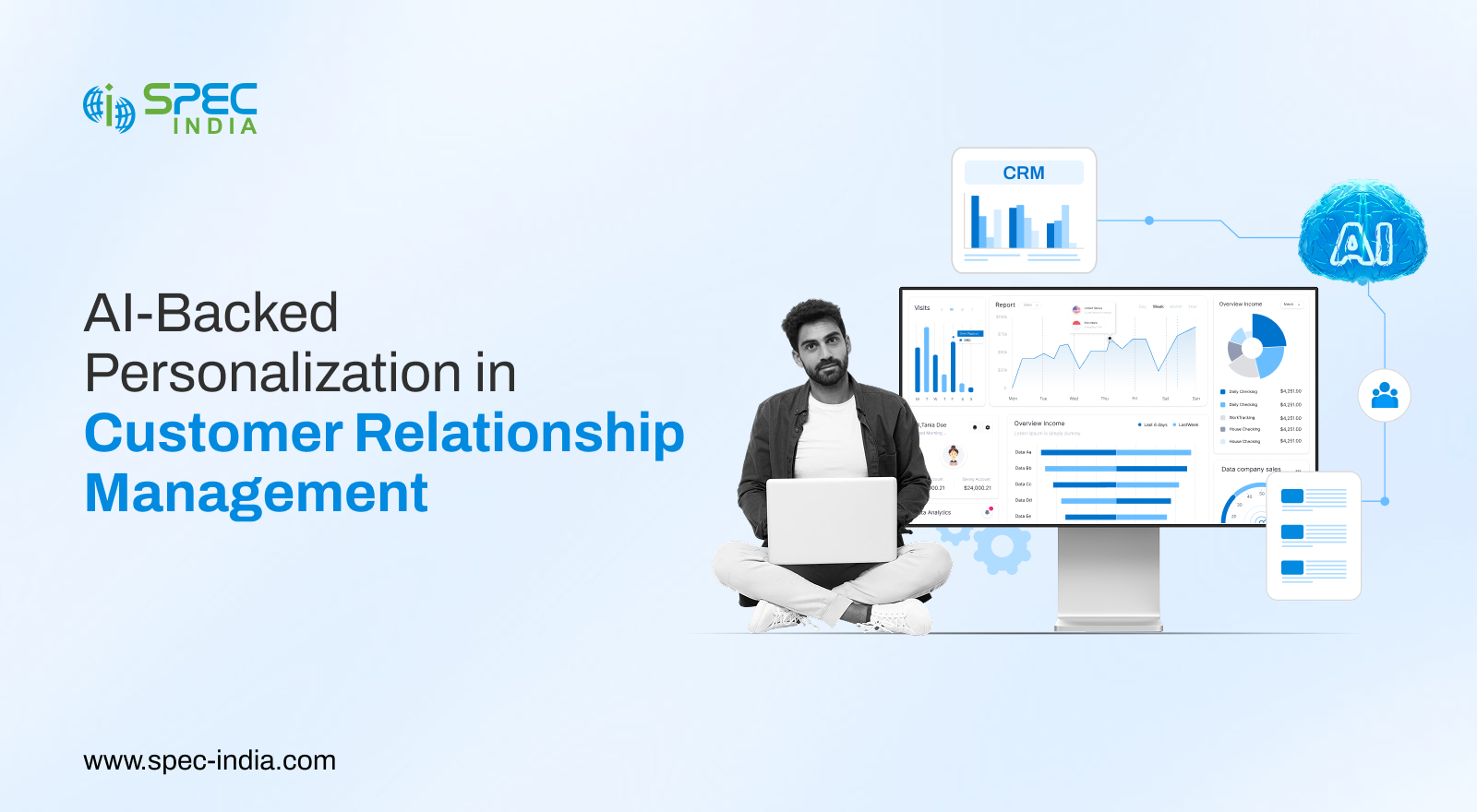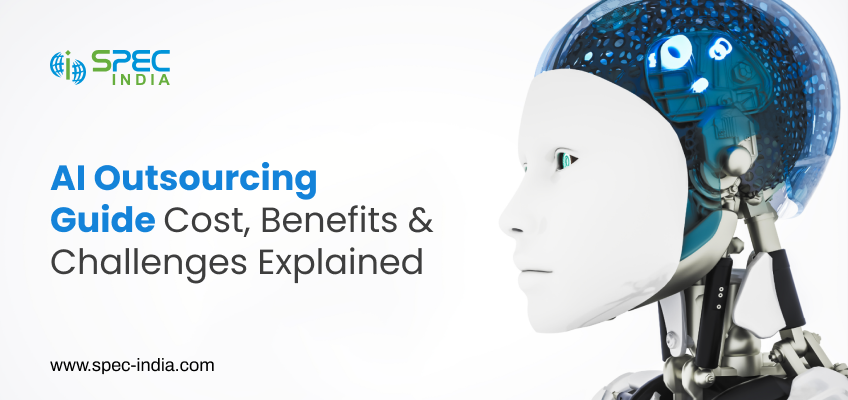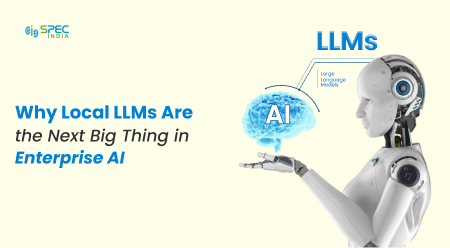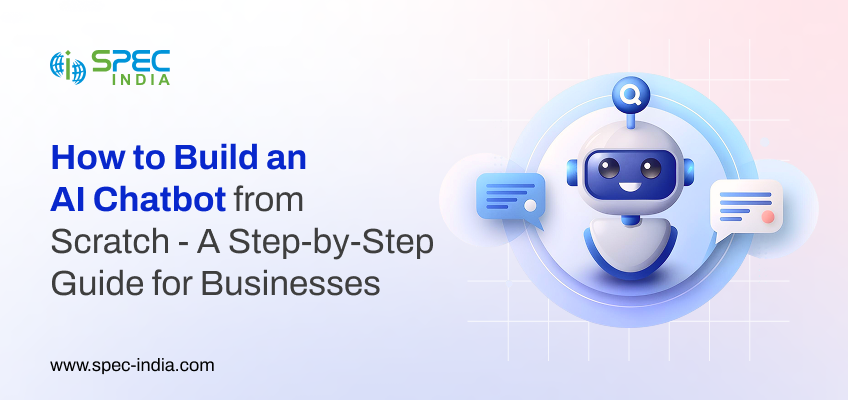How AI in CRM Drives Personalized Experiences and a Seamless Customer Journey
UpdatedNovember 19th, 2025

Businesses are introducing new ways to interact with and attract customers, which is a dire need for any business to sustain itself in a competitive market. According to McKinsey, 71% of customers remain loyal to brands that offer personalized experiences, while 76% abandon brands that promise but fail to keep them engaged.
Every company that invests in offering personalized experiences gets a considerable payoff. Businesses receive 40% more revenue AI software development companies as remuneration. AI in CRM systems is helping internal teams achieve sales growth and improve conversions by 83% and 35%, respectively. Artificial Intelligence in CRM enhances traditional workflows, enabling dynamic and intelligent personalization.
Tip: AI makes tasks that would typically take hours or weeks a matter of minutes. You must not miss a chance to adopt AI for CRM and implement it in your business.
It helps in knowing your customers in and out through sentiment analysis, smart lead scoring, and customer journey orchestration.
This article explores how organizations can utilize AI-driven personalization and how our software developers’ expertise can turn your CRM into a growth engine.
Why Does AI-Driven Personalization Matter in CRM?
CRM is an integral part of any business, and enhancing it is a core focus of business owners. Integrating AI for CRM is not a luxury but a requirement that deserves attention. It brings more than expected results for businesses. Here is how you can benefit from AI-backed CRM machine learning models for your business.
When traditional CRMs were used, they relied on fixed rules and generic profiles. However, with AI-driven CRM software, you can enable real-time adaptation, analyze customer behavior, and deliver personalized engagement in interactions.
- Meeting Customer Expectations
Customers want to feel like a king and expect brands to know them. They enjoy receiving recommendations that cater to their taste, respond promptly, and offer consistent experiences across every touchpoint, such as emails, chats, and social media.
- Boosting Lead Conversions
Artificial intelligence in CRM analyzes customers’ browsing history, email engagements, and social interactions to determine their authenticity, interests, and intent. Such information definitely helps businesses focus on marketing and sales-qualified leads, promoting higher conversion rates with AI-driven sales automation.
- Driving Retention & Loyalty
When you offer personalized experiences or make customers feel close to the brand, businesses grow exponentially. This happens when you solve their issues proactively without letting them raise complaints and anticipate their needs. On the other hand, predictive analytics in CRM also enables AI software development companies to predict customer behavior and take proactive measures to retain them.
- Maximizing Customer Lifetime Value
Another significant advantage of AI in CRM is unlocking upselling and cross-selling opportunities, which makes customer relationships more profitable over time. AI helps recommend the right products or services by evaluating historical purchases, engagement patterns, and user preferences.
- Staying Ahead of the Competition
As discussed earlier, organizations that utilize AI CRM software have witnessed 40% revenue growth from personalization activities, which is significantly better than their competitors. AI helps in anticipating market trends, optimizing campaigns in real-time, and responding rapidly to customer requirements.
How Generative AI Uplifts Customer Experiences With Strategic Actions?
Generative AI CRM unveils customer experience using deep learning and advanced technology, enabling businesses to harness the full potential of data and continually enhance their customer interactions.
| Aspect |
Impact |
Strategic Actions |
| Customization |
Generative AI leverages customer data across marketing, sales, and service functions to modify experiences for each customer. |
Utilizes CRM Data: Businesses should enhance their CRM systems to optimize the use of their user data, enabling them to customize every interaction and provide users with satisfactory responses. |
| Trust & Ethics |
Customers expect transparency and the ethical use of AI, particularly regarding data handling and decision-making processes. |
Develop Ethical Frameworks: Businesses should create guidelines for AI use that prioritize customer privacy and data security. |
| Employee Augmentation |
Gen AI ensures the upgrading of job roles while automating mundane tasks, enabling staff to focus on high-value activities strategically. |
Upgrade Training & Development: Ensure the seamless implementation of training programs that enable employees to work optimally with AI tools, while fostering effective human-machine collaboration. |
| Content Creation |
AI even helps in creating content without compromising on quality while engaging customers. |
Augment Design Capabilities: enables creative teams to leverage AI tools for software development and intelligent document processing to innovate and streamline content production while maintaining high-quality output. |
| Customer Experience |
Apart from content creation, AI even helps in making customer experiences memorable by building user-friendly interfaces. |
Prioritize AI Integration in Design: Embedding AI capabilities in the initial phases of product development can significantly enhance user engagement. |
| Marketing & Outreach |
AI-driven insights upgrade your marketing efforts and direct outreach, nurturing customer connections. |
Customized Marketing Strategies: Leverage predictive analytics in CRM, evaluate user behavior, and create targeted marketing campaigns that resonate on a personal level. |
AI-Based CRM Use Cases
AI enhances traditional CRM, enabling faster, smarter, and more personalized user interactions. Here are several use cases:
The traditional lead scoring models were rigid and outdated. Artificial intelligence in CRM enables t high-potential highly potential leads in hand to work on.
AI and natural language processing (NLP) enable the interpretation of customer emotions. It analyzes emails, chats, and social media comments. For example, it can identify customer frustration in a support ticket and escalate the ticket more quickly for query resolution, thereby improving the customer satisfaction rate. This is one of the key features of AI CRM software today.
- Predictive Sales Forecasting
With AI, you can even forecast future demand, as AI analyzes historical data and provides accurate results. As a result, businesses can allocate resources proactively and set realistic goals with predictive analytics in CRM.
- Customer Journey Orchestration
AI helps you with a customer journey roadmap and offers the best possible next step to make them feel familiar and involved. It includes sending customized offers, scheduling follow-ups, or initiating a retention campaign. As a result, it ensures individualized campaigns across all touchpoints.
- Automated Customer Support
When you build an AI chatbot and virtual assistant seamlessly, it handles routine queries, freeing up human agents to focus on critical, attention-worthy tasks. With AI agents, response times are reduced, and your customers receive 24/7 service.
Integrating AI into Your Existing CRM: Challenges & Solutions
AI is definitely empowering existing CRM systems with unparalleled capabilities, but does it come that easily, or are there any challenges? There are several challenges businesses need to consider when planning to integrate AI into CRM. Here is a breakdown of the hurdles along with sure-shot solutions.
Data Silos & Quality Issues
Challenges: Customer data is scattered across various departments, leading to inconsistency and fragmentation, which eventually leads to poor data quality and a lack of accuracy.
Solutions: Connect data into a unified platform and implement data-cleaning processes. AI enables extraction of high-quality structured information; investing in data governance pays long-term dividends. |
|
Legacy System Limitations
Challenges: Legacy-based CRM systems often lack integration capabilities.
Solutions: Introduce middleware or migrate to cloud-based AI CRM software. A phased integration approach minimizes disruptions and modernizes the tech stack. |
|
Lack of Technical Expertise
Challenges: Teams may lack command over AI tech like machine learning, system integration, and data science.
Solutions: Partner with experienced AI developers to maintain AI models customized to your CRM’s architecture. |
|
Data Privacy & Compliance
Challenges: Handling confidential data increases compliance risk under regulations such as GDPR and CCPA.
Solutions: Implement robust encryption, access controls, and conduct regular compliance audits. Ethical AI practices should be implemented in every layer of the system. |
The Future of Artificial Intelligence in CRM Systems
Now that you have read about the current possibilities with AI in CRM, you must also know the future scope of AI in CRM systems. It will give you an idea of what to expect from AI and CRM systems in the future.
- Personalization Upgradation
AI-backed CRM systems offer unparalleled personalization, enabling businesses to gain valuable insights easily. This information allows companies to tailor interactions to customer preferences, resulting in more efficient customer experiences.
- Better Predictive Analytics
AI will uplift CRM systems with powerful predictive analytics capabilities. It will predict customer behaviors and preferences, which allows businesses to match customer requirements and address potential issues proactively.
- Automated Customer Integrations
AI will also help automate daily customer interactions, freeing up human agents to handle more complex queries. As a result, it includes intelligent chatbots and virtual assistants that provide instant, humanized responses to customer queries.
AI enables advanced data evaluation, which quickly and accurately extracts key insights from large datasets. As a result, businesses would be able to make informed decisions and strategize effectively.
- Modernized Customer Service Apps
With artificial intelligence, you can deliver enhanced customer service within CRM systems, including real-time sentiment analysis to capture customer emotions and automated problem-solving for less common issues.
Ready to take your CRM to the next level?
Discover how AI can personalize interactions, improve accuracy, and drive results; let’s get started!
Conclusion
Artificial intelligence in CRM is no longer just a topic of discussion; it is a bring-to-life capability. With AI in CRM, the ecosystem learns, adapts, and offers distinctive experiences at scale. It entirely revolutionizes your business’s interactions with clients. AI enables enterprises to make meaningful interactions, including innovative lead scoring, real-time sentiment analysis, and customer journey orchestration.
Businesses utilizing AI CRM software are revamping customer engagement while promoting efficiency. The studies also show a remarkable 40% increase in revenue growth and a noticeably higher level of customer loyalty. Noticeably greater levels of customer loyalty. The difference lies in understanding customers not as data points, but as dynamic relationships that evolve with every click, message, or purchase.
SPEC INDIA is your trusted partner for AI-driven software solutions, with proven expertise in digital transformation and innovative technology services. We deliver secure, reliable, and high-quality IT solutions to clients worldwide. As an ISO/IEC 27001:2022 certified company, we follow the highest standards for data security and quality. Our team applies proven project management methods, flexible engagement models, and modern infrastructure to deliver outstanding results. With skilled professionals and years of experience, we turn ideas into impactful solutions that drive business growth.






